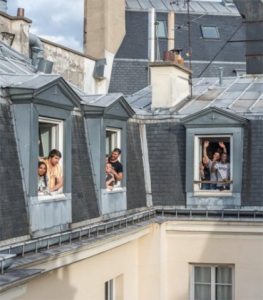Housing initiative pairs refugees with Paris locals
An experimental new housing project in Paris is seeing a group of refugees share accommodation with locals.
Near the Louvre Museum, eleven refugees are spending a year living with thirteen French people as a unique ‘family’.
 The refugee residents, aged 20 to 35, are Somali, Guinean, Afghan and Sudanese and thanks to the Caracol organisation, they will live for a year with locals in a typical Parisian building.
The refugee residents, aged 20 to 35, are Somali, Guinean, Afghan and Sudanese and thanks to the Caracol organisation, they will live for a year with locals in a typical Parisian building.
All of the roommates are students or young working people. They share the premises of a 1,000-square-metre building that includes several common areas: a kitchen, a living room and a work room.
In order to participate in the project, several conditions have to be met.
Participants need to be over 18 years of age and have a valid residence permit for foreigners.
Each flatmate pays a maximum rent of 200 euros per month, in accordance with France’s housing reform law, the Élan Act.
The money is used primarily to cover utilities. The association pays the corresponding sum to the owner of the premises, the City of Paris Real Estate Board, the second largest public landlord in the capital.
Residents are welcome to supplement their rent in the form of donations to the association.
Originally, the building was to remain vacant until it was converted into public housing at the end of September 2021. The system proposed by Caracol benefits the landlord because, with the building occupied, the organisation does not have to pay for maintenance.
The initiative also helps to relieve France’s housing crisis, which particularly affects large cities.
“On the one hand, many French people have difficulty finding housing. On the other hand, exiles may find themselves without a solution after leaving an emergency shelter. And yet there are thousands of empty square meters in Paris,” said Caracol’s Simon Guibert said.
Applicants for the co-living project cannot be in urgent need of housing, however, because the selection process takes time.
Prior to moving in, the residents took part in some maintenance work. They cleaned the premises and equipped the building with furniture salvaged from a homeless charity.
The residents have since tried to bring life to the shared home with yoga classes, French and Arabic classes, dance and sewing workshops, all conducted with respect for social distancing.
The refugees see the initiative as a step toward integrating in France.












